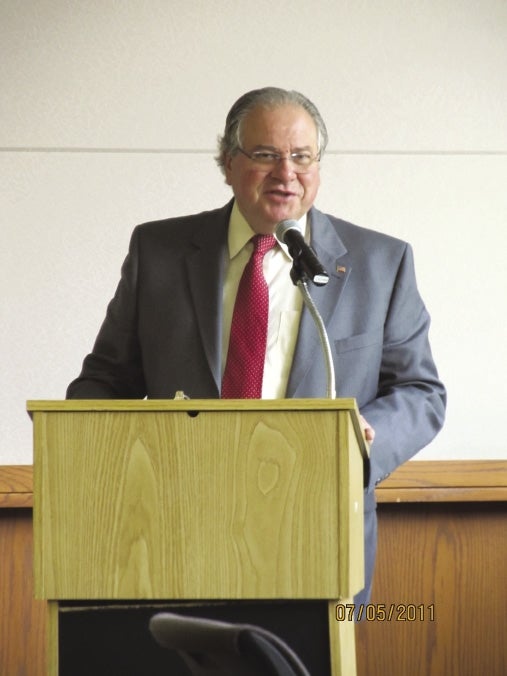Report Cites Manufacturing Growth In Mass.
 PHOTO/EMILY MICUCCI
Massachusetts House Speaker Robert DeLeo urged industry leaders gathered last week in Worcester to take advantage of funding in new economic development legislation that can help boost the skills of workers in the industry.
PHOTO/EMILY MICUCCI
Massachusetts House Speaker Robert DeLeo urged industry leaders gathered last week in Worcester to take advantage of funding in new economic development legislation that can help boost the skills of workers in the industry.
Manufacturing has taken a hard hit over the last decade but there are signs that it's making a modest comeback across Massachusetts, according to a manufacturing report card released by Northeastern University last week.
The report card, prepared by the Kitty and Michael Dukakis Center for Urban and Regional Policy at Northeastern and released Sept. 13, showed that the number of manufacturing companies in the Bay State increased instead of decreased last year for the first time since 2002.
There were 43 new manufacturing companies in 2011, a marked increase from 2010, when the number dropped by 81. That number is even more impressive considering that, since 2002, the state has lost a total of 2,146 manufacturing firms, the report cited.
But there have been some important changes that have created challenges for manufacturers, particular those in the advanced manufacturing sector, the report found.
More than 40 percent of the state's manufacturing firms reported difficulty finding skilled workers to replace those who are retiring or leaving the industry, the report said. And it appears that the majority of available manufacturing jobs today require a higher level of education and training than they did 40 years ago.
In 2010, the majority of Massachusetts manufacturing jobs — 31.2 percent —were considered high tech, an increase of about 6 percent since 2000, and more than 11 percent since 1970. Low-tech manufacturing jobs dropped from just under 40 percent in 1970 to 24.5 percent in 2010, according to the report, while medium low-tech and medium high-tech jobs each increased slightly between 1970 and 2010.
The number of all manufacturing jobs in the Bay State has decreased significantly, from about 290,000 in 2008 to about 250,000 as of June 2012, and has yet to show signs of recovery, the report noted.
Education & Training
Jack Healy, director at the Worcester-based Massachusetts Manufacturing Extension Partnership (MassMEP), spoke about manufacturing industry employment last week at a meeting of his agency's Manufacturing Advancement Center Workforce Innovation Collaborative (MACWIC).
Education and training for manufacturing jobs of today, a major focus of the newly-formed MACWIC, are more crucial now than ever, he said.
“The jobs that remain are much more technical,” Healy said. “That's why we have the jobs available, and not enough people to do them.”
Help for the manufacturing industry in Central Massachusetts was the key topic at the MACWIC meeting, where House Speaker Robert A. DeLeo was the keynote speaker.
DeLeo explained to manufacturing industry leaders how an economic development bill passed by the Legislature in July will provide funding for workforce and technological development.
The programs will be paid for by casino licensing fees. Thirteen percent of the revenue will be used to support manufacturing development initiatives, which will amount to about $25 million, according to DeLeo.
“I'm hopeful that each of you here today will take advantage of the programs included in (the) development bill,” DeLeo told a group of about 40 that gathered at Worcester Technical High School.
MassDevelopment, a quasi-public agency that focuses on economic development, will oversee these programs, which are not yet active. According to DeLeo, the state is working to hire an administrator to oversee the initiative, and he hopes programs will be up and running by the end of the year.
“We have to make sure we don't get all bogged down in bureaucracy,” DeLeo said.
Companies Show Interest
Manufacturing company officials said the information DeLeo outlined was new to them, but they seemed interested in pursuing new grant and loan programs that may propel their companies into a new era.
“We're paying the taxes, and we'll take advantage of whatever is available,” said Kenneth J. Mandile, president of Swissturn/USA, a precision machine shop in Oxford.
The most pressing issue for advanced manufacturers like Swissturn, according to Mandile, is finding workers who are qualified for available jobs. There are plenty of people with a few years of experience in the field, but hardly any with at least 15 years of experience. Mandile said the most experienced workers, who have the technical skills required for the jobs, left the field when the Great Recession hit.
Cathy Phillips, co-owner of Phillips Precision of Boylston, said her company recently struggled to fill a position for a machinist.
“We had no applicants,” said Phillips, a member of the MACWIC education steering committee.
The job was posted in all the usual places. Finally, a couple of people applied, but they were employees of other local shops. Phillips said poaching workers from neighboring companies is unethical. The need for qualified workers will only get stronger, according to Phillips, as about 300 machinists statewide are expected to retire in 2013.
Read more
A World View Of Manufacturing: Q&A With Wayne Canty Of Heat Trace Products









0 Comments